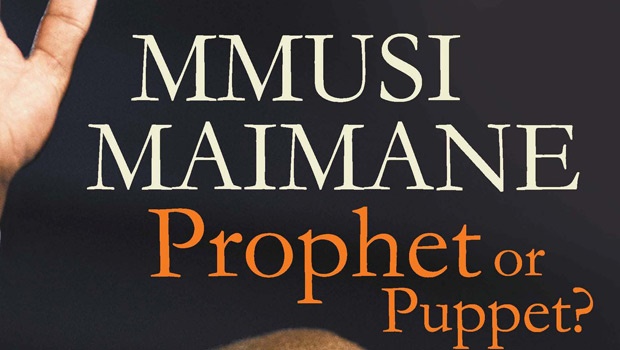
This excerpt from Mmusi Maimane: Prophet or Puppet? was published with permission from Jonathan Ball publishers and is now available from all leading bookstores.
Jousting against the red berets
(This excerpt starts from Page 125 in the book and explores the nature of the relationship between the EFF’s Julius Malema and Mmusi Maimane)
The EFF has positioned itself as a leftist and radical African nationalist organisation set up to fight the ‘neo-liberal’ policies of the governing ANC. Its ‘revolutionary’ credentials cannot be enhanced by a close association with the DA – a party Malema has always rejected as a parliamentary shop steward for ‘white monopoly capital’.
The DA, for its part, sees the EFF as ‘ANC lite’ and believes that the party’s ‘populist policies’ – which include the nationalisation of mines, banks and other major industries as well as land restitution without compensation – would ruin the economy.
At the heart of their differences is not just ideology, but the fierce battle for the disaffected black voters they each need to grow into a serious alternative to the ANC. In the 2014 elections, the DA won just over 4 million votes, about 50 per cent of which came from white voters.
The other half was from coloured, Indian and black voters. What was most significant for the DA about that election, the last to be fought under Zille’s leadership, was that about 750 000 of those votes were from black voters.
This meant that the DA was now the third most popular political party among black voters, a few hundred thousand votes shy of matching the EFF, which secured over a million votes, the majority of them from black voters.
Maimane’s election as DA leader meant that the party’s energies would now be devoted to expanding its support base within this constituency, something that both Malema and the ANC would have seen as a potential threat.
Just days after Maimane announced that he would avail himself as a candidate for the position of DA federal leader following Zille’s announcement that she was to step down, Malema went on the offensive:
‘We are over the moon as the EFF because we won’t have serious competition from Helen to Mmusi. It’s now us and the ANC and I think we’ll take it from here.’
He also told reporters at another event that he was worried that if Maimane won the DA leadership race, he ‘will turn the DA into a church’: ‘Politics don’t need pastors. They need politicians. The DA is going to be converted into a church,’ Malema said in reference to Maimane’s other role as a pastor.
Malema’s dismissal and ridiculing of Maimane as a worthy adversary sought to hide his worry over a new kind of DA, one that could no longer be easily scoffed at as a ‘white people’s party’.
With Maimane, his peer and a black leader, in charge, Malema knew that he would now have to contend with more than the ANC as he tried to position the EFF as the party of choice for black youth. Even as the two worked closely in Parliament in 2016 in the bid to force Zuma out of office, Malema was still portraying Maimane as an unworthy opponent.
A day after the DA held a relatively successful election manifesto launch at the Rand Stadium in Johannesburg, the first mass rally of its kind for them, Malema was in Ebony Park in Midrand telling supporters to ignore Maimane because he was not in charge of the DA: ‘Don’t be misled by the DA. The DA has two leaders. It’s Helen Zille and Mmusi Maimane. Mmusi is used to attract black voters; the real leader is Helen Zille who is the white leader of the DA.’
Although Maimane’s approach since becoming DA leader has been to see other opposition parties less as adversaries and more as partners in the struggle to reduce the ruling party’s dominance, he has had his choice words for the EFF.
In July 2014, two months after he and Malema became members of Parliament, Maimane told the Cape Town Press Club that the EFF leader was a hypocrite and a populist whose ideas were irrelevant and unworkable: ‘It remains to be seen what the EFF is going to do, and whether or not there will be constant reporting on the wearing of red overalls and domestic worker uniforms to Parliament,’ he said.
(At the time, the EFF was still the flavour of the month in Parliament, grabbing public attention away from the DA and other opposition parties through its unusual dress code and combative approach to parliamentary debates.)
In late 2015, with the DA’s internal figures showing that the EFF’s potential support among voters had doubled to about 12 per cent nationwide while the DA’s had remained stagnant at around 25 per cent, Maimane again took a hardline position:
‘I think the better coalition would be between the ANC and the EFF because they believe in the same things, effectively.’
He considered himself to be in competition with ‘the ANC/EFF alliance’ as the two parties ‘are both drawing out of the same policy space’ while the DA wanted to see alternative policies implemented.
Zille had held a similar view in the run-up to the 2014 general elections, stating categorically that the DA ‘will not enter into a coalition with the EFF under any circumstances’ as such a move ‘would be unworkable’ given the huge ideological gulf between them. She also saw the EFF and the ANC as ‘two sides of the same coin’.
Maimane put forward a set of conditions as the basis for any coalition with other opposition parties that made him seem unlikely to be interested in a formal relationship with the EFF, especially at national level.
The DA, he insisted, would not enter into any coalition with any political party that ‘mobilises on the basis of race’.
To purchase a copy of the book, visit Takealot.com.




 Publications
Publications
 Partners
Partners










